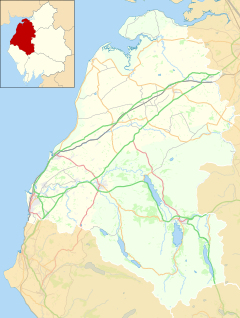Siddick
| Siddick | |
|---|---|
 Siddick Ponds Nature Reserve | |
| OS grid reference | NY000311 |
| • London | 260 mi (420 km) S |
| Civil parish | |
| District | |
| Shire county | |
| Region | |
| Country | England |
| Sovereign state | United Kingdom |
| Post town | WORKINGTON |
| Postcode district | CA14 |
| Dialling code | 01900 |
| Police | Cumbria |
| Fire | Cumbria |
| Ambulance | North West |
| UK Parliament | |
Siddick is a village in Cumbria, England, historically part of Cumberland. It is situated on the A596 road, approximately 2 miles (3 km) north from the town of Workington. It lies within Workington civil parish.
As a coastal settlement on the Solway Firth (which is an inlet of the Irish Sea), fishing contributes to the local economy.[1]
There is a large manufacturing area to the east of the village, with Swedish paper maker Iggesund Paperboard operating a large facility there. Eastman Chemical Company and Indorama Corporation used to own chemical plants in Siddick, but these have subsequently closed.[2] To the south of the village is Dunmail Park shopping centre, where there is a multiplex cinema, a supermarket, and a number of other shops.[3]
Governance
Siddick is part of the Workington constituency of the UK parliament. The current Member of Parliament as of 2019 is Mark Jenkinson, a Conservative, who unseated former MP Sue Hayman at the 2019 General Election.[4] The Labour Party had previously won the seat in every general election since 1979; the Conservative Party had only won the 1976 Workington by-election since the Second World War.[5]
For the European Parliament residents in Siddick voted to elect MEP's for the North West England constituency.
For Local Government purposes it is in the Seaton + Northside Ward of Allerdale Borough Council and the Seaton Division of Cumbria County Council.
Siddick has its own Parish Council; Workington Town Council.[6]
Siddick Ponds Nature Reserve
Siddick Ponds Nature Reserve is a protected area and Site of Special Scientific Interest to the south of the village.[7] Ten thousand years ago the ponds were part of a delta in what is now the River Derwent. The name "Siddick" is believed to have come from "Siggit" or "Seagate", a racecourse formerly located close by. Coal was extracted from the St Helens pit nearby and affected the area; after the pit closed the land was reclaimed and replanted to create new wildlife habitats.[8]
References
- ^ WRC information. Water Research Centre. 1980. p. 319. Retrieved 19 July 2012.
- ^ Barwise, Jenny; "Bosses of Cumbrian factory deny closure rumours" Archived 2013-10-11 at the Wayback Machine, News & Star, 17 August 2013. Retrieved 17 June 2014
- ^ "About Us". Dunmail Park. Retrieved 28 August 2019.
- ^ "Tories win Workington from Labour". BBC News. 13 December 2019. Retrieved 13 December 2019.
- ^ "A vision of Britain website – general elections section". Retrieved 27 April 2012.
- ^ "Workington Town Council".
- ^ "Siddick Ponds, Siddick", Allerdale Borough Council. Retrieved 17 June 2014
- ^ "Visit Workington". Archived from the original on 7 September 2018.

